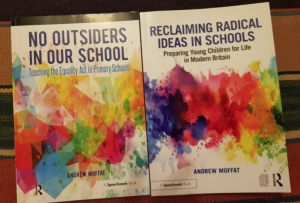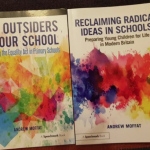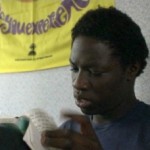
Given the controversy over Andrew’s work in Parkview School I thought it was wise for Schools OUT UK to review his books and explore his work. Andrew and I have known each other for many years as I was a consultant on the original No Outsiders project started by Dr. Elizabeth Atkins in 2006.
Andrew has drawn heavily on their original project that was aimed solely at challenging homophobia and widened it to, as we say in Schools OUT UK, educate out prejudice, and has designed the project to enable his students and parents to consider all the protected characteristics:
· age
· gender reassignment
· being married or in a civil partnership · being pregnant or on maternity leave · disability
· race including colour, nationality, ethnic or national origin
· religion or belief
· sex and
· sexual orientation.
His schools is in a predominantly Muslim area. The use of the term ‘No Outsiders’ came from Desmond Tutu who was passionate about building a new state where everyone was recognised and equal. Alas that is still a dream in his country (South Africa) though the laws are in place to support that. The culture has a long way to go before the dream becomes a reality.
Reading the 2 books now, knowing the appalling attacks on the work, with some parents and members of the community picketing the school and withdrawing their children, it feels as if this the concept of No Outsiders is a very big challenge
What Andrew chronicles in both books however is an honest account of both the successes and failures of the work but what come across is in fact the successes. We at Schools OUT UK have produced a series of lesson plans at www.the-classroom.org.uk that usualise lgbt issues across the curriculum for all ages. I choose to coin the term usualise as I feel that normalise is a highly problematic word.
Andrew has in his books, produced lesson plans based on delightful children’s books that enable teachers to explore the human rights of all the protected characteristics and is a gentle, effective way to usualise the concept of inclusion and the celebration of difference.
It is worth noting, given the controversy, that of the 35 books only 4 deal with lgbt issues.
The lesson plans cover all key stages in a primary school and are easy to follow. It is clear that the project needs to involve from the whole school and Andrew recounts how he in a previous school, failed to do that effectively, with problematic consequences. Therefore, at Parkfield he was careful to work on a whole schools approach, which we agree is essential. When we at Schools OUT UK train staff in schools, our preferred method is to work with all the staff including admin, maintenance and catering, as they need to be part of the process and reinforce the inclusive message.
The No Outsiders book is slim, easy to read and guides you through Andrew’s process of both the planning required and the delivery of the project. He presents you with 35 simple effective lesson plans and ideas on how to use the 35 books that he has chosen to educate out prejudice. The sub title, ‘Teaching the Equality Act in Primary Schools’ reminds us that, we now have laws in place that require us to tackle negative discrimination and educate people about the protected characteristic which were not in place when the original No Outsiders project began.
The Public sector duty of the Equaity Act 2010 says
Those subject to the equality duty must, in the exercise of their functions, have due regard to the need to:
· Eliminate unlawful discrimination, harassment and victimisation and other conduct prohibited by the Act.
· Advance equality of opportunity between people who share a protected characteristic and those who do not.
· Foster good relations between people who share a protected characteristic and those who do not.
‘Reclaiming Radical Ideas in Schools’, describes success in engaging the parents of the school. Andrew wants to be part of enabling his school to safe guard their children and give teachers the tools to deal with the often-frightening news stories and events that the children are regularly exposed to. The media thrives on bad news and horror, hardly a diet we want our children to feed on. Andrew wants his school to be a safe space where every child feels listened to and respected. Schools also have to be mindful of the prevent duty and ensure that the students understand the risks associated with terrorism and develop the knowledge and skills to be able to challenge extremist arguments.
Giving children confidence to feel they belong to the community that they are amongst people who celebrate who they are and feel capable of celebrating people who are different from them is a crucial component of such work.
At a time of rising hate crime since the referendum and the shenanigans of navigating Brexit or rather Ukexit, we have seen that many people have felt emboldened to express misogynistic, racist, homophobic and disablist attitudes that have spilled into actions.
In this book, Andrew introduces us to the work he is doing with parents and their children using his tried and tested method of basing sessions on children’s books. He has chosen 13 books, different from the ones in the No Outsiders project and designed exciting interactive activities, which enable the children and parents to spend quality time together in the classroom reading the books and exploring issues such as migration, refugees, religion and lgbt issues. Andrew shares with us how he adapts his ideas and the activities as he observes how the parents react and how he incorporates parent’s ideas mean we have the luxury of learning from his rich experience.
The classroom teacher ran the sessions with Andrew assisting, thus enabling the parents to cement their relationship with their child’s teacher. All the lessons are presented in the book and are easy to follow with fun imaginative activities. The overwhelming message is everyone is different and we can all get along.
The parents, Andrew found, really appreciated the sessions and as the weeks went by more came as the word got round they were worth going to.
So what went wrong? Not being there, I can only speculate. The Kate Godfrey videos, which made many outlandish claims about what RSE was going to do, certainly stirred a great deal of trouble. It is clear that many parents were galvanised by her words and Andrew often had them repeated at him. However, I wonder if there was another agenda.
It occurs to me that Andrew was succeeding in engaging parents, predominantly mothers in discussing a variety of vital issues and they were gaining confidence in talking about them. I wonder if some of the very patriarchal members of the Muslim community did not appreciate this and they wished to find a way to circumvent the work. I do not know, but something very odd happened to shift opinion in some of the parents, which was a shame, after so much thought, care, and commitment had been put into the project by all concerned. I was interested to see in an article in The Guardian “It isn’t about the kids any more,” says Saima Razzaq, a local Muslim activist who describes herself as “queer”. “It’s about Shakeel’s ego. I think he’s a pawn – there are other figures involved in these protests who are trying to whip up this same hostility up and down the country.”
I would thoroughly recommend both books. They are both really careful, thought through, well written accounts of how to run a project that supports the Equality Act in a fun imaginative way. The lesson plans will no doubt inspire other ideas in teachers and the 2 books introduce you to a wealth of brilliant children’s books that would grace any classroom and offer schools the chance to explore a variety of issues.
Many schools have used the No Outsiders books now with great success. The problems that surfaced in some schools is appalling. We can only hope that in the future the DFE will be more robust in supporting this vital work, that is rooted in the various pieces of legislation in this country that promote human rights and equality.
Schools are grappling with the new RSE curriculum. There will be much written about it and many resources provided to support it. Schools will need to do, as Andrew did, work with parents, but it is crucial that the DFE do make it plain as they say in Get the Facts on Relationship and Sex education that parents do not have a veto.
‘Q: Will my child’s school have to consult with me before teaching these subjects?
A: Schools will be required to consult with parents when developing and reviewing their policies for Relationships Education and RSE, which will inform schools’ decisions on when and how certain content is covered. Effective consultation gives the space and time for parents to input, ask questions, share concerns and for the school to decide the way forward. Schools will listen to parent’s views, and then make a reasonable decision as to how they wish to proceed. What is taught, and how, is ultimately a decision for the school and consultation does not provide a parental veto on curriculum content.
A school’s policies for these subjects must be published online, and must be available to any individual free of charge. Schools should also ensure that, when they consult parents, they provide examples of the resources they plan to use, for example the books they will use in lessons.’ The Sex and Relationship Education Guidance This guidance applies until September 2020. New relationships education, relationships and sex education (RSE) and health education statutory guidance then replaces it. For more information resources and Andrews books see here
It is crucial, it seems to me, that the ethos of ‘NO Outsiders’ is enabled in schools and that teachers feel confident and skilled to do the work that will enshrine human rights and the celebration of the human family.






